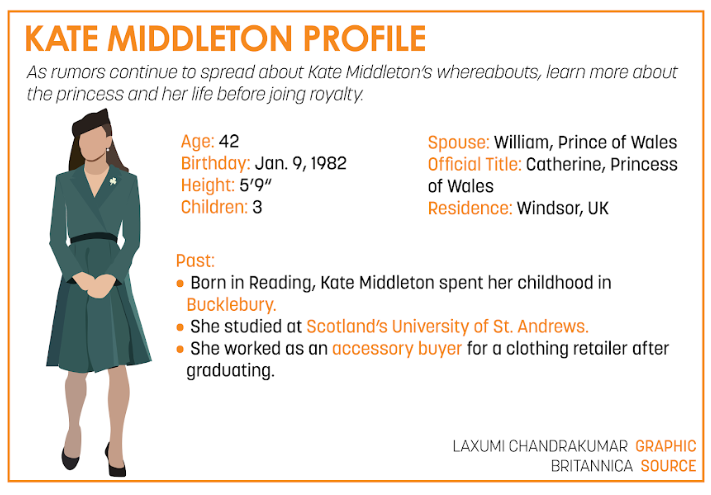Kate Middleton just released a statement informing the public of her cancer diagnosis. Previously she vanished from the public eye, and was deemed to be “missing” since last Christmas, according to a New Yorker article; in a Jan. 17 statement, the Kensington Palace announced that Middleton was recovering from an abdominal surgery.
The public was quick to point out the statement’s discrepancies. The abnormally long two week hospital stay raised eyebrows, as according to Medstar Health, most abdominal surgeries only require about one week at the hospital. Furthermore, when King Charles III revealed that he had prostate cancer, and the Duchess of York had malignant melanoma, both had maintained public appearances and transparency–so why hadn’t Middleton?
Rumors on her health, safety, and relationships spread on the internet at record breaking speeds. Some believed she was put in an induced coma. Speaking on “Fiesta,” a Spanish TV show, host Concha Calleja said that doctors had to intubate Middleton to save her life.
While the royal family debunked this theory, others were quick to replace it. The public asserted theories that Middleton’s marriage was shaky, she was in hiding, or that she was killed and replaced with a body double. While these theories are interesting, the jokes and memes posted online are what drew my attention.
The public joked that Middleton was growing out poorly cut curtain bangs, got a Brazilian Butt Lift, or disappeared at the Willy’s Chocolate Experience in Glasgow.
The American media, recently with articles even analyzing her track record and assessing her credibility, has been obsessed with this story.
Explaining this, journalist Elizabeth Holmes writes, “For the most part of thirteen years, we’ve regularly seen this woman, and the fact that we haven’t now is notable.”

The reason why traction towards this topic has reeled in so many people is due to the mystery and drama of this situation. Conspiracies in general arise from the tendency to fill in gaps in understanding with whatever narrative makes sense in the moment, as if they were strings of red yarn connected on a corkboard. In this case, the British monarchy’s involvement further boosts the mass media mindset. The figureheads of British politics are instead purely celebrities in the eyes of American media.
Furthermore, tales of royalty have been a staple in entertainment, from children’s stories to soap dramas like “Downton Abbey” or “Bridgerton.”
“The monarchy becomes a kind of Holy Grail for everyone because that is the ultimate in terms of wealth, power, glamor, charisma,” literature professor Maria Tatar said. “It’s all of those things which you don’t have in the boring at-home situations.”
Because of America’s lack of a monarchy, citizens want to watch the opera unfold somewhere else, and the country’s ties with Britain provide a perfect avenue for the American public. The distance between the two nations geographically fosters a disconnect large enough for British affairs to have minimal effect on daily American life, while maintaining close historical and cultural ties for public interest.
Though, as entertaining as it may be to theorize and poke fun at celebrities online, it’s important to recognize the humanity and identities of the people living behind the screen.

































![AI in films like "The Brutalist" is convenient, but shouldn’t take priority [opinion]](https://hilite.org/wp-content/uploads/2025/02/catherine-cover-1200x471.jpg)









































![Review: “The Immortal Soul Salvage Yard:” A criminally underrated poetry collection [MUSE]](https://hilite.org/wp-content/uploads/2025/03/71cju6TvqmL._AC_UF10001000_QL80_.jpg)
![Review: "Dog Man" is Unapologetically Chaotic [MUSE]](https://hilite.org/wp-content/uploads/2025/03/dogman-1200x700.jpg)
![Review: "Ne Zha 2": The WeChat family reunion I didn’t know I needed [MUSE]](https://hilite.org/wp-content/uploads/2025/03/unnamed-4.png)
![Review in Print: Maripaz Villar brings a delightfully unique style to the world of WEBTOON [MUSE]](https://hilite.org/wp-content/uploads/2023/12/maripazcover-1200x960.jpg)
![Review: “The Sword of Kaigen” is a masterpiece [MUSE]](https://hilite.org/wp-content/uploads/2023/11/Screenshot-2023-11-26-201051.png)
![Review: Gateron Oil Kings, great linear switches, okay price [MUSE]](https://hilite.org/wp-content/uploads/2023/11/Screenshot-2023-11-26-200553.png)
![Review: “A Haunting in Venice” is a significant improvement from other Agatha Christie adaptations [MUSE]](https://hilite.org/wp-content/uploads/2023/11/e7ee2938a6d422669771bce6d8088521.jpg)
![Review: A Thanksgiving story from elementary school, still just as interesting [MUSE]](https://hilite.org/wp-content/uploads/2023/11/Screenshot-2023-11-26-195514-987x1200.png)
![Review: "When I Fly Towards You", cute, uplifting youth drama [MUSE]](https://hilite.org/wp-content/uploads/2023/09/When-I-Fly-Towards-You-Chinese-drama.png)
![Postcards from Muse: Hawaii Travel Diary [MUSE]](https://hilite.org/wp-content/uploads/2023/09/My-project-1-1200x1200.jpg)
![Review: "Ladybug & Cat Noir: The Movie," departure from original show [MUSE]](https://hilite.org/wp-content/uploads/2023/09/Ladybug__Cat_Noir_-_The_Movie_poster.jpg)
![Review in Print: "Hidden Love" is the cute, uplifting drama everyone needs [MUSE]](https://hilite.org/wp-content/uploads/2023/09/hiddenlovecover-e1693597208225-1030x1200.png)
![Review in Print: "Heartstopper" is the heartwarming queer romance we all need [MUSE]](https://hilite.org/wp-content/uploads/2023/08/museheartstoppercover-1200x654.png)



